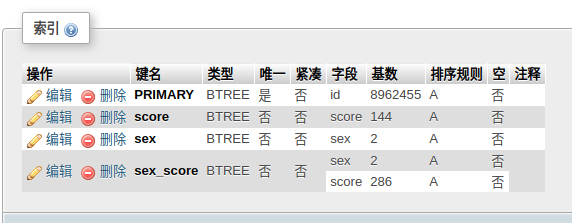100W数据,测试复合索引
复合索引不是那么容易被catch到的。
两个查询条件都是等于的时候,才会被catch到。
mysql> select count(*) from tf_user_index where sex = 2 and score > 80;
+----------+
| count(*) |
+----------+
| 1261904 |
+----------+
1 row in set (10.65 sec)
mysql> select count(*) from tf_user where sex = 2 and score > 80;
+----------+
| count(*) |
+----------+
| 1261904 |
+----------+
1 row in set (4.38 sec)
mysql> explain select count(*) from tf_user_index where sex = 2 and score > 80;
+----+-------------+---------------+------+---------------+------+---------+-------+---------+-------------+
| id | select_type | table | type | possible_keys | key | key_len | ref | rows | Extra |
+----+-------------+---------------+------+---------------+------+---------+-------+---------+-------------+
| 1 | SIMPLE | tf_user_index | ref | score,sex | sex | 1 | const | 4481227 | Using where |
+----+-------------+---------------+------+---------------+------+---------+-------+---------+-------------+
1 row in set (0.08 sec)
查询条件中,如果有大于号。那么优先抓取等于号对应的索引,也就是sex对应的索引。经过索引的一番折腾,查询时间反而更长了。
即便是把score放到前面,一样的效果。
mysql> explain select count(*) from tf_user_index where score> 80 and sex = 2;
+----+-------------+---------------+------+---------------+------+---------+-------+---------+-------------+
| id | select_type | table | type | possible_keys | key | key_len | ref | rows | Extra |
+----+-------------+---------------+------+---------------+------+---------+-------+---------+-------------+
| 1 | SIMPLE | tf_user_index | ref | score,sex | sex | 1 | const | 4481227 | Using where |
+----+-------------+---------------+------+---------------+------+---------+-------+---------+-------------+
两个条件都为等于的时候,索引的效果就有点明显了。
mysql> select count(*) from tf_user_index where sex = 2 and score = 80;
+----------+
| count(*) |
+----------+
| 63230 |
+----------+
1 row in set (1.09 sec)
mysql> select count(*) from tf_user where sex = 2 and score = 80;
+----------+
| count(*) |
+----------+
| 63230 |
+----------+
1 row in set (2.61 sec)
mysql> explain select count(*) from tf_user_index where sex = 2 and score = 80;
+----+-------------+---------------+-------------+---------------+-----------+---------+------+--------+------------------------------------------------------+
| id | select_type | table | type | possible_keys | key | key_len | ref | rows | Extra |
+----+-------------+---------------+-------------+---------------+-----------+---------+------+--------+------------------------------------------------------+
| 1 | SIMPLE | tf_user_index | index_merge | score,sex | score,sex | 4,1 | NULL | 124004 | Using intersect(score,sex); Using where; Using index |
+----+-------------+---------------+-------------+---------------+-----------+---------+------+--------+------------------------------------------------------+
1 row in set (0.00 sec)
这个时候,并没有添加复合索引。
加了复合索引,如果查询条件是大于号,一样catch不到。
mysql> explain select count(*) from tf_user_index where sex = 2 and score > 80;
+----+-------------+---------------+------+---------------------+------+---------+-------+---------+-------------+
| id | select_type | table | type | possible_keys | key | key_len | ref | rows | Extra |
+----+-------------+---------------+------+---------------------+------+---------+-------+---------+-------------+
| 1 | SIMPLE | tf_user_index | ref | score,sex,score_sex | sex | 1 | const | 4481227 | Using where |
+----+-------------+---------------+------+---------------------+------+---------+-------+---------+-------------+
1 row in set (0.01 sec)
mysql> select count(*) from tf_user_index where score > 80 and sex =2;
+----------+
| count(*) |
+----------+
| 1261904 |
+----------+
1 row in set (15.32 sec)
竟然执行了15秒之久。
这条sql语句可以优化一下,将sex也改为大于号。
mysql> select count(*) from tf_user_index where score > 80 and sex >1;
+----------+
| count(*) |
+----------+
| 1261904 |
+----------+
1 row in set (0.66 sec)
mysql> explain select count(*) from tf_user_index where score > 80 and sex >1;
+----+-------------+---------------+-------+---------------------+-----------+---------+------+---------+--------------------------+
| id | select_type | table | type | possible_keys | key | key_len | ref | rows | Extra |
+----+-------------+---------------+-------+---------------------+-----------+---------+------+---------+--------------------------+
| 1 | SIMPLE | tf_user_index | range | score,sex,score_sex | score_sex | 4 | NULL | 4481227 | Using where; Using index |
+----+-------------+---------------+-------+---------------------+-----------+---------+------+---------+--------------------------+
1 row in set (0.00 sec)
这样就捕捉到了索引。
mysql> select count(*) from tf_user_index where score = 80 and sex = 1;
+----------+
| count(*) |
+----------+
| 62866 |
+----------+
1 row in set (0.01 sec)
mysql> explain select count(*) from tf_user_index where score = 80 and sex = 1;
+----+-------------+---------------+------+---------------------+-----------+---------+-------------+--------+-------------+
| id | select_type | table | type | possible_keys | key | key_len | ref | rows | Extra |
+----+-------------+---------------+------+---------------------+-----------+---------+-------------+--------+-------------+
| 1 | SIMPLE | tf_user_index | ref | score,sex,score_sex | score_sex | 5 | const,const | 124794 | Using index |
+----+-------------+---------------+------+---------------------+-----------+---------+-------------+--------+-------------+
1 row in set (0.00 sec)
mysql> select count(*) from tf_user_index where sex = 1 and score=80;
+----------+
| count(*) |
+----------+
| 62866 |
+----------+
1 row in set (0.01 sec)
mysql> explain select count(*) from tf_user_index where sex = 1 and score=80;
+----+-------------+---------------+------+---------------------+-----------+---------+-------------+--------+-------------+
| id | select_type | table | type | possible_keys | key | key_len | ref | rows | Extra |
+----+-------------+---------------+------+---------------------+-----------+---------+-------------+--------+-------------+
| 1 | SIMPLE | tf_user_index | ref | score,sex,score_sex | score_sex | 5 | const,const | 124794 | Using index |
+----+-------------+---------------+------+---------------------+-----------+---------+-------------+--------+-------------+
1 row in set (0.00 sec)
顺序并不重要。
索引,复合索引,确实可以提供查询的速度。关键是,要能够捕捉到。要能够找寻它们捕捉的规律。理解它们执行的过程。
合理的分析查询的规律,合理的给表添加索引。分析常用的查询,分析常用的查询字段。通过explain字段来进行sql语句的分析,优化sql语句。

实践发现sex_score,score_sex查询的效果是一样的,关键是能否捕捉到。
mysql> explain select count(*) from tf_user_index where sex = 2 and score>80;
+----+-------------+---------------+-------+---------------------+-----------+---------+------+---------+--------------------------+
| id | select_type | table | type | possible_keys | key | key_len | ref | rows | Extra |
+----+-------------+---------------+-------+---------------------+-----------+---------+------+---------+--------------------------+
| 1 | SIMPLE | tf_user_index | range | score,sex,sex_score | sex_score | 5 | NULL | 2446346 | Using where; Using index |
+----+-------------+---------------+-------+---------------------+-----------+---------+------+---------+--------------------------+
1 row in set (0.00 sec)
mysql> select count(*) from tf_user_index where sex = 2 and score>80;
+----------+
| count(*) |
+----------+
| 1261904 |
+----------+
1 row in set (0.31 sec)
我屮艸芔茻,sex_score竟然捕捉到了索引。看来顺序还是有所区别的。这个建索引还是多多的实验吧。孰能生巧。
100W数据,测试复合索引的更多相关文章
- 100W数据,测试索引
两张表,结构相同,数据内容相同.唯一不同的就是是否包含索引.tf_user_index表中包含索引. 这100w数据,我造了近一天时间. mysql> select count(*) from ...
- SQL Server 执行计划利用统计信息对数据行的预估原理二(为什么复合索引列顺序会影响到执行计划对数据行的预估)
本文出处:http://www.cnblogs.com/wy123/p/6008477.html 关于统计信息对数据行数做预估,之前写过对非相关列(单独或者单独的索引列)进行预估时候的算法,参考这里. ...
- 关于SQL查询效率,100w数据,查询只要1秒
1.关于SQL查询效率,100w数据,查询只要1秒,与您分享:机器情况p4: 2.4内存: 1 Gos: windows 2003数据库: ms sql server 2000目的: 查询性能测试,比 ...
- SQL Server创建复合索引时,复合索引列顺序对查询的性能影响
说说复合索引 写索引的博客太多了,一直不想动手写,有一下两个原因:一是觉得有炒剩饭的嫌疑,有兄弟曾说:索引吗,只要在查询条件上建索引就行了,真的可以这么暴力吗?二来觉得,索引是个非常大的话题,很难概括 ...
- SQL SERVER大话存储结构(4)_复合索引与包含索引
索引这块从存储结构来分,有2大类,聚集索引和非聚集索引,而非聚集索引在堆表或者在聚集索引表都会对其 键值有所影响,这块可以详细查看本系列第二篇文章:SQL SERVER大话存储结构 ...
- Mysql limit 优化,百万至千万级快速分页,--复合索引的引用并应用于轻量级框架
MySql 性能到底能有多高?用了php半年多,真正如此深入的去思考这个问题还是从前天开始.有过痛苦有过绝望,到现在充满信心!MySql 这个数据库绝对是适合dba级的高手去玩的,一般做一点1万篇新闻 ...
- MySQL复合索引探究
复合索引(又称为联合索引),是在多个列上创建的索引.创建复合索引最重要的是列顺序的选择,这关系到索引能否使用上,或者影响多少个谓词条件能使用上索引.复合索引的使用遵循最左匹配原则,只有索引左边的列匹配 ...
- Sql Server之旅——第九站 看公司这些DBA们设计的这些复合索引
这一篇再说下索引的最后一个主题,索引覆盖,当然学习比较好的捷径是看看那些大师们设计的索引,看从中能提取些什么营养的东西,下面我们看 看数据库中一个核心的Orders表. 一:查看表的架构 <1& ...
- Sql Server之旅——第八站 复合索引和include索引到底有多大区别?
周末终于搬进出租房了,装了宽带....才发现没网的日子...那是一个怎样的与世隔绝呀...再也受不了那样的日子了....好了,既然网 安上去了,还得继续我的这个系列. 索引和锁,这两个主题对我们开发工 ...
随机推荐
- Android官方架构组件介绍之LiveData
LiveData LiveData是一个用于持有数据并支持数据可被监听(观察).和传统的观察者模式中的被观察者不一样,LiveData是一个生命周期感知组件,因此观察者可以指定某一个LifeCycle ...
- 解决命令行执行shell脚本成功,但crontab执行失败
实际生产案例 生产机房自建PPTP客户端通过拨号连接到生产机房,但是一旦客户端网络是意外断线再重新拨号 会产生IP冲突,于是写了一个脚本监控PPTP的IP是否有多个(一般冲突以后会生成2个IP) #! ...
- Python爬虫基础(一)urllib2库的基本使用
爬虫也就是所谓的网络数据采集,是一种通过多种手段收集网络数据的方式,不光是通过与 API 交互(或者直接与浏览器交互)的方式.最常用的方法是写一个自动化程序向网络服务器请求数据(通常是用 HTML 表 ...
- html中使用JS实现图片轮播效果
1.首先是效果图,要在网页中实现下图的轮播效果,有四张图片,每张图片有自己的标题,然后还有右下角的小方框,鼠标悬浮在小方框上,会切换到对应的图片中去. 2.先是HTML中的内容,最外层是轮播图整个的容 ...
- UChome Feed 机制
Feed,本意是“饲料.饲养.(新闻的)广播等”. 我们就拿用户发表日志这个动作来简单看看Uchome的feed机制. 用户发布日志所使用的函数是 source/function_blog.php文件 ...
- Spark中文文本分析建模
实用的朴素贝叶斯模型建模 建模过程主要是把文本转化成向量然后再作分析 数据格式: ,善良 美丽 ,丑陋 阴险 卑鄙 ,温和 ....... 注:前面是给文章贴的标签,后面是文章的分词,分词可以找关于分 ...
- [css]浮动-清除浮动的3种方法
清除浮动的方法: 内墙法 注: 这是个奇淫技巧,没什么原理可言,记住即可 这个技巧又使得父box重新可以被子box撑开高度了. 隔墙法-适用于2个box之间上下排列 由于2个box高度依旧是0, 彼此 ...
- PAT 1073 Scientific Notation[字符串处理][科学记数法]
1073 Scientific Notation(20 分) Scientific notation is the way that scientists easily handle very lar ...
- Linux系统——Ansible批量管理工具
批量管理工具: (1)ansible 操作简单(适用于500台以下服务器) (2)saltstack 比较复杂(一般适用于1000-4w台服务器) (3)puppet超级复杂 systemctl(统一 ...
- Java用数据结构解决实现问题之数学问题
有趣的整数: 完数:如果一个数字恰好等于他的因子之和,就叫做完数,需求是求出10000以内的所有的完数. 解法:1.用n去除以1-n之间的所有的整数,将能整除的被除数保存到一个数组中,作为n的一个因子 ...
